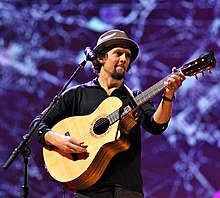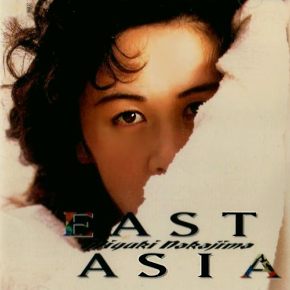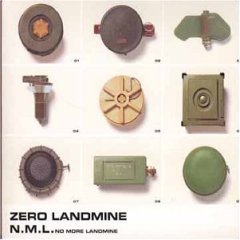Key projects
AP Bank Fes
The first AP Bank Fes took place from July 16 to 18, 2005 in Kakegawa, Shizuoka as a multi-purpose outdoor festival, featuring live performances but also a wide variety of areas to teach about environmental issues such as sustainable development, natural farming and renewable energy issues like solar power. It features a marketplace selling various natural goods as well as relaxation areas and a natural food court. AP Bank Fes encourages the audience to bring their own cutlery to the event, while the waste generated is separated into nine categories so that most can be recycled. [4] AP Bank Fes expanded to three festival sites in 2012, including Hyogo and Miyagi Prefectures. [16]
The main festival site is provided by the Yamaha Corporation and led to an initiative called Japan Natural Energy "Green Power Certificate" to provide "green power" for other music events at the site. It is expected to conserve 500,000 kWh of electricity and reduce 230 tons of CO
2 emissions per year at the site. [4]
Funds raised from the festival, which attracts around 60,000 people, and resultant CDs and DVDs, are donated to AP Bank. The live shows are structured with Kazutoshi Sakurai's Bank Band as the main performer, featuring various guests vocalists, which have included;

- 2005 - Salyu, Chara, Every Little Thing, Hitoto Yo, Tortoise Matsumoto (Ulfuls), Mika Nakashima etc.
- 2006 - Kobukuro, BoA, Bonnie Pink, Miki Imai, Remioromen, Quruli, Kreva etc.
- 2007 - Ai, Depapepe, Ulfuls,
Rip Slyme, Kumi Koda, Sukima Switch(cancelled due to typhoon) etc. - 2008 - Glay, My Little Lover, Ayaka Hirahara, Chihiro Onitsuka, Yuzu, Aska etc.
- 2009 - Juju, Kumi Koda, Yuna Ito, Ai Otsuka, Eikichi Yazawa, Porno Graffitti etc.
- 2010 - Cocco, Mongol800, Puffy, Dragon Ash, Toshinobu Kubota, Funky Monkey Babys etc.
- 2011 - Hitoto Yo, Shikao Suga. Minmi, Naoto Inti Raymi, Sukima Switch, Bonnie Pink etc.
- 2012 - Jason Mraz, Ken Hirai, Crystal Kay, Spitz, Monkey Majik, Def Tech etc.
AP BANG! Tokyo Creators' Meeting
AP Bank organises an all-night club event for artists, musicians, and other creative people called AP BANG! Tokyo Creators' Meeting. The purpose is to make people think about the environment, through creations and performances for a younger crowd that might typically have less interest or knowledge of environmental concerns. [3] Vol.1 took place over three days at Studio Coast in Shin Kiba, Tokyo, from March 16-18th, 2007 and featured art directors, filmmakers, web designers and copywriters as well as performing acts such as Seamo, Kyōko Koizumi and Ayaka.
Eco-reso web
AP Bank operates an extensive network of websites and blogs called eco-reso web (エコレゾ ウエブ). Initially a web magazine that communicates about events in Japan and around the world relating to the environment by means of news articles, videos and illustrations, eco-reso web now includes a wide range of web pages on various ecological, environmental, eco-farming and sustainable development issues. [3]
Kurkku
Kurkku is a Tokyo-based project owning several shops under the theme "future-oriented living that is comfortable and good for the environment". Kurkku sells food and clothing and AP Bank provides conceptual input and assistance. [3] Kurkku's main restaurant and cafe are located in Harajuku. [17] Code kurkku, serving Italian-style food [18] prepared by executive chef Yasuhiro Sasajima, whose Kyoto restaurant Il Ghiottone is said to "serve the finest Italian cuisine in all of Western Japan", [17] and is housed within the Yoyogi Village complex.
Yoyogi Village
Combining elements of many of AP Bank's projects, Yoyogi Village is perhaps its most open to the general public, aiming to break the perception that environmentally friendly products are bland or boring. [10] It was built in order to reinvigorate Yoyogi on the old site of the 19th century Yoyogi village, before the rise of the neighboring districts Shinjuku and Harajuku led to the areas decline. [19] Yoyogi Village consists of the two zones surrounding a central landscaped garden by Seijyun Nishihata featuring trees from Spain, Chile, Brazil and Mexico. [19]
The village consists of a wide range of stores, cafes and restaurants as well as a travel agent, massage parlor and gardens. The Container Zone is made from old shipping containers and sells fashion from organic cotton farms in India at One Mile Wear, houses the Pour-kur bakery, organic Drink & Soup Kurkku Lab, Roots & Beat Coffee and Tako Yoyogi izakaya and hosts the Blind Gallery. [19]
The Village Zone hosts The Music Bar designed by Kobayashi and fellow producer Shinichi Osawa, VIP areas and the Code Kurkku dining and terrace area with discounted organic food prepared by Kyoto chef Yasuhiro Sasajima. The land in the center of Tokyo has been leased for an initial ten years, with a view to building more villages in the future. [10]
AP Bank Fund
In July 2007, the Niigata 2007 Chūetsu offshore earthquake hit Japan's Niigata Prefecture, at the same time as the AP Bank Fes'07 music festival was taking place - itself cut from three days to one due to a typhoon. As a result of these two catastrophes, AP Bank Fund was created to provide funds for disaster relief, separate from AP Bank's regular lending operations. The ap bank fund was created in September 2007, and in June 2008 it provided relief funds for victims of the 2007 Chūetsu offshore earthquake, a devastating cyclone in Myanmar, and another major earthquake in Sichuan, China. [3]










